外研版高中英语必修3 Module 1 Europe Grammar---主谓一致教学课件(共36张PPT)
文档属性
| 名称 | 外研版高中英语必修3 Module 1 Europe Grammar---主谓一致教学课件(共36张PPT) | 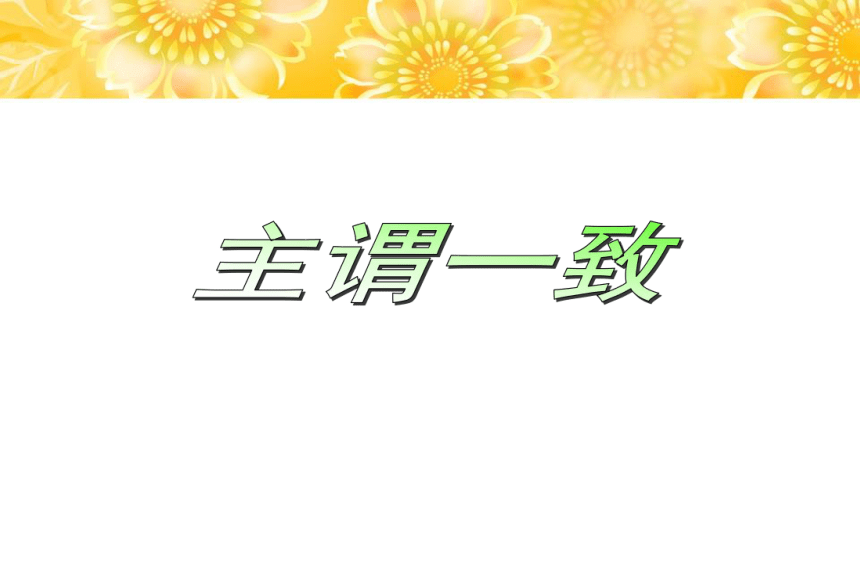 | |
| 格式 | zip | ||
| 文件大小 | 306.2KB | ||
| 资源类型 | 教案 | ||
| 版本资源 | 外研版 | ||
| 科目 | 英语 | ||
| 更新时间 | 2019-03-16 17:40:01 | ||
图片预览

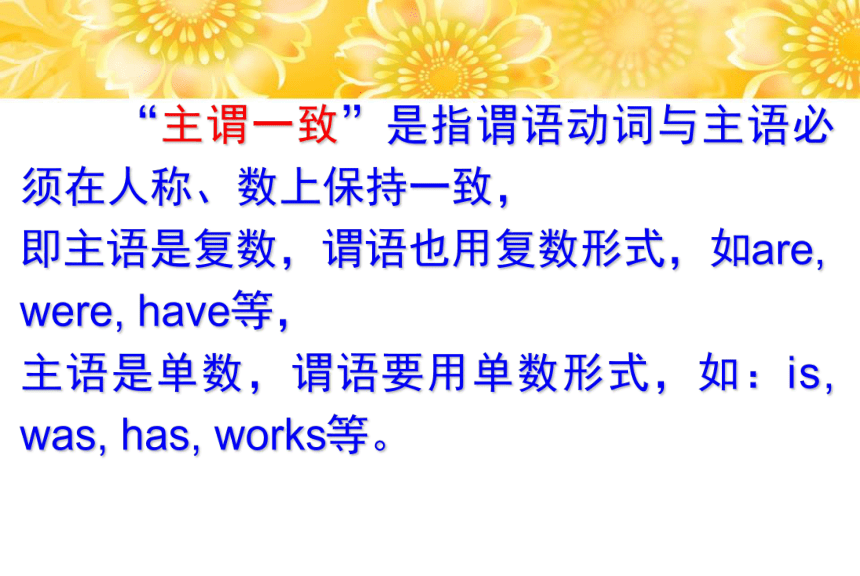
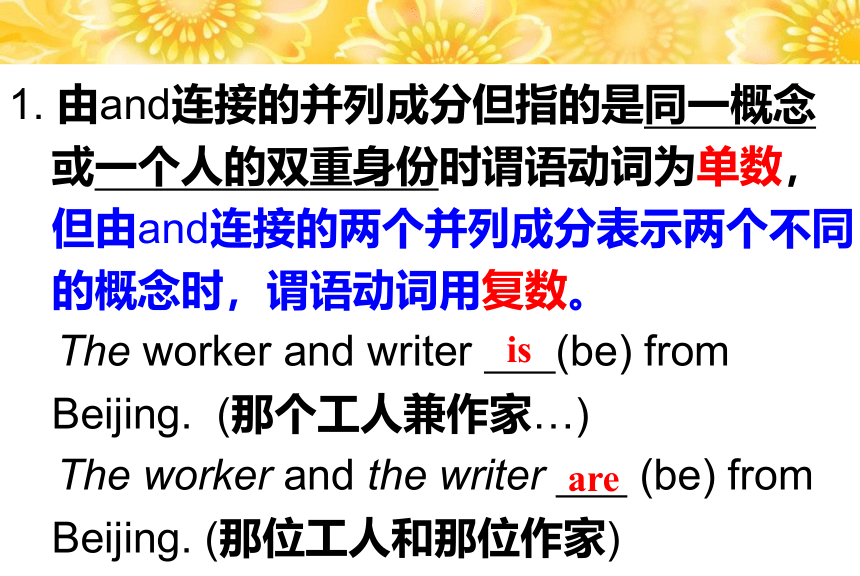
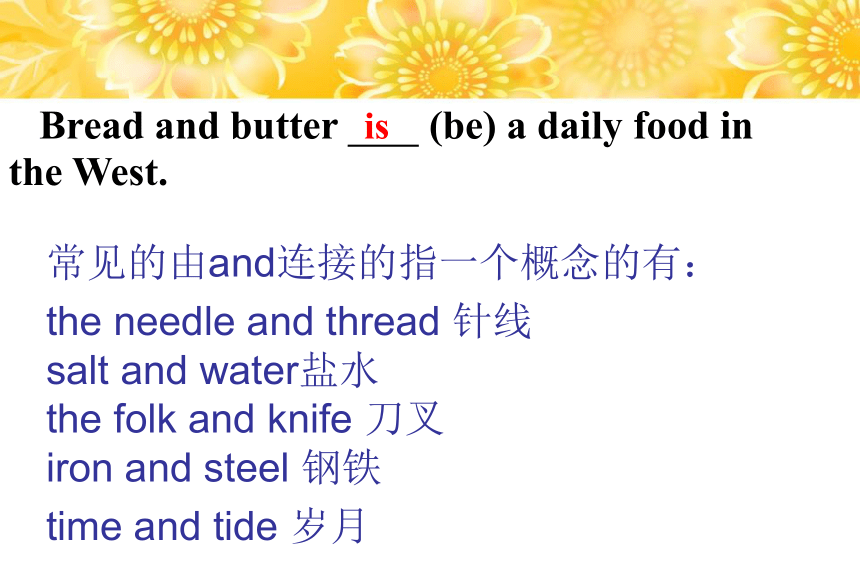
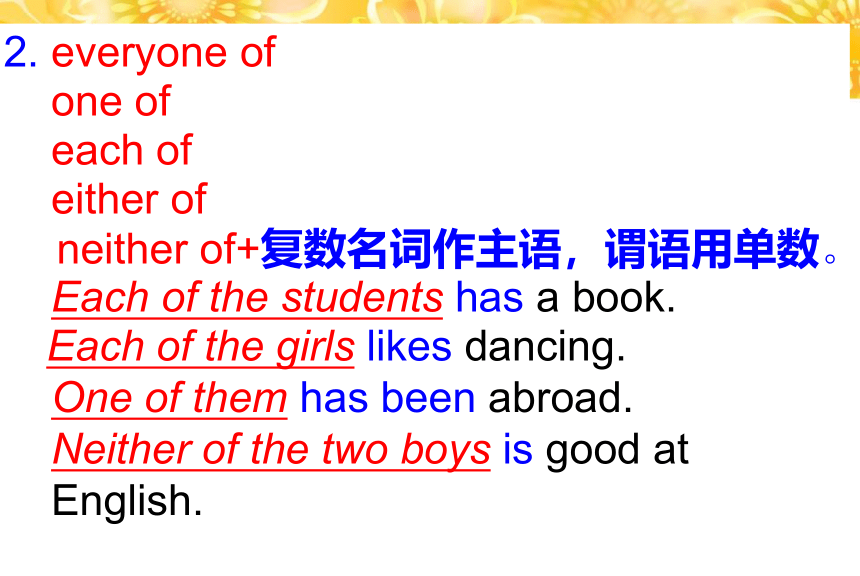
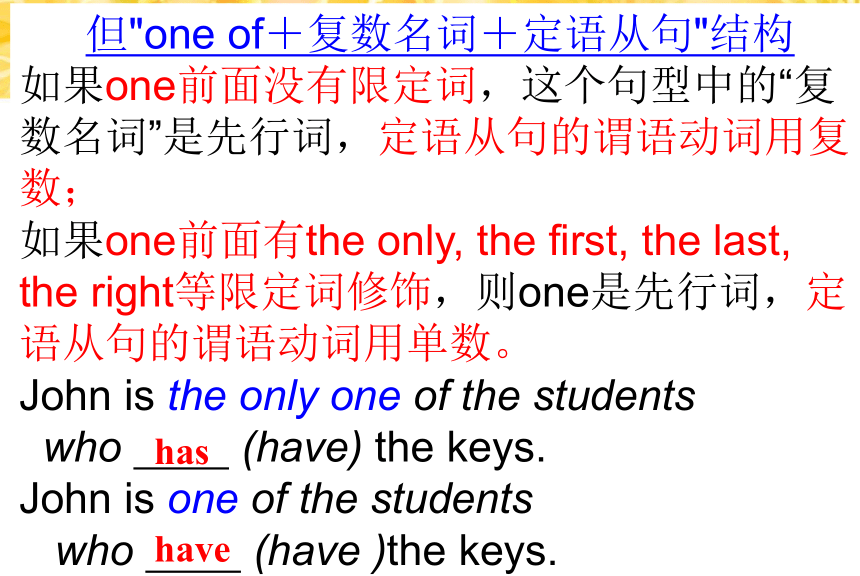
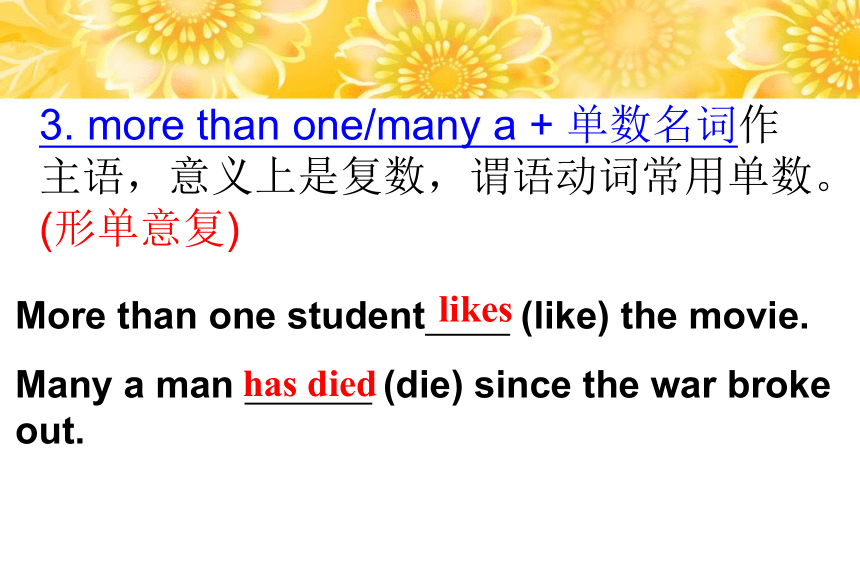
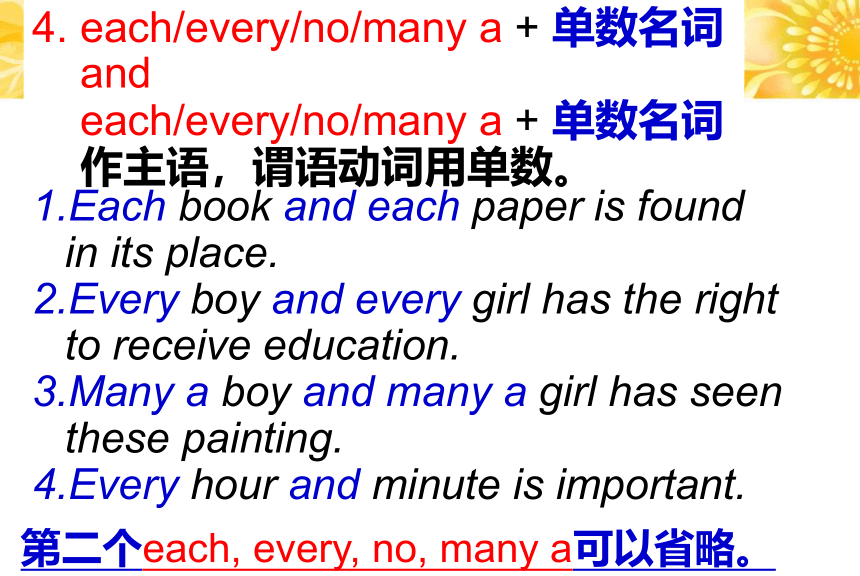
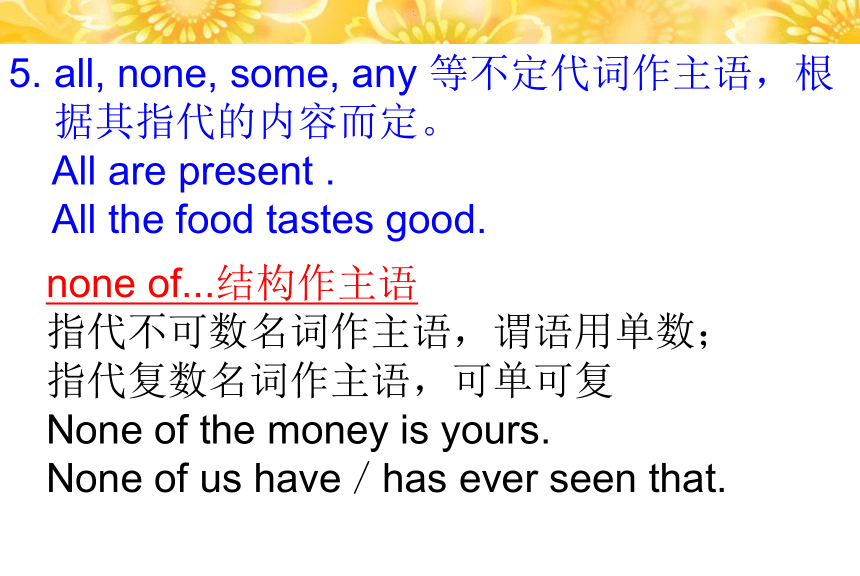
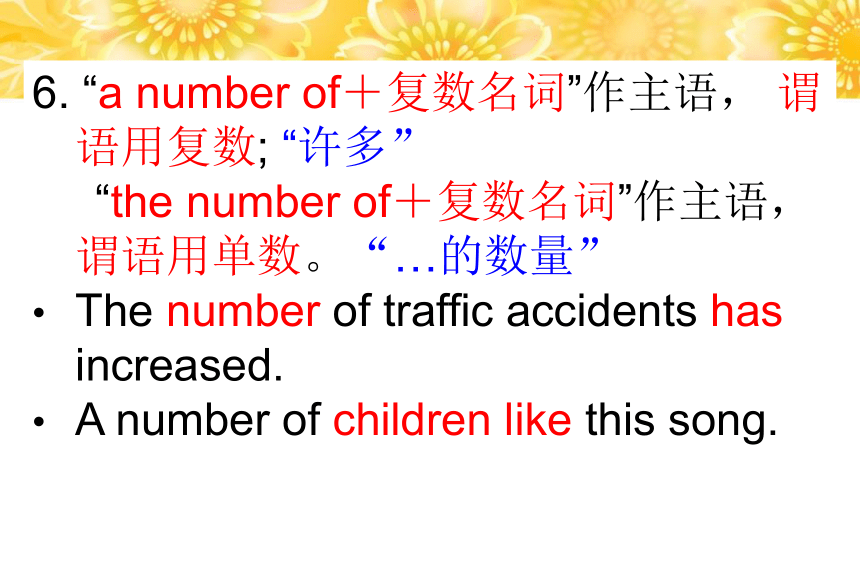
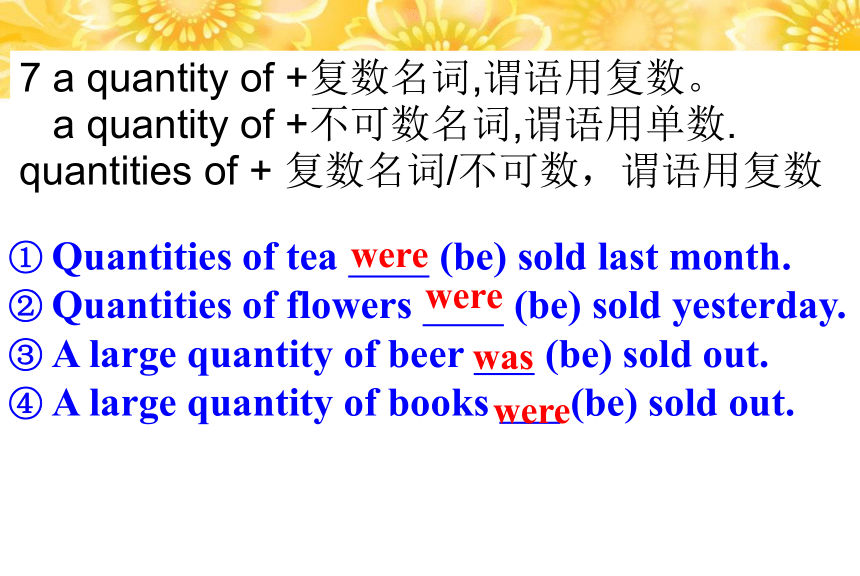
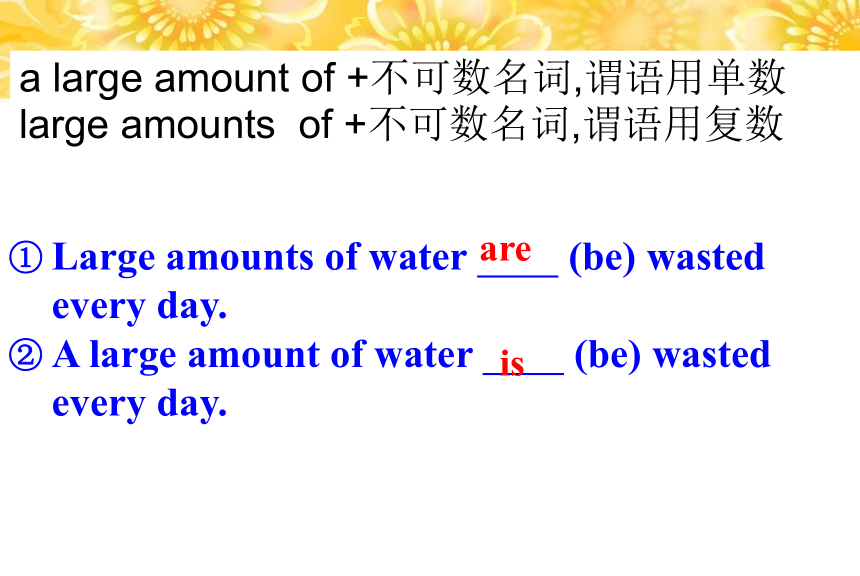
文档简介
课件36张PPT。主谓一致
“主谓一致”是指谓语动词与主语必须在人称、数上保持一致,
即主语是复数,谓语也用复数形式,如are, were, have等,
主语是单数,谓语要用单数形式,如:is, was, has, works等。1. 由and连接的并列成分但指的是同一概念或一个人的双重身份时谓语动词为单数,但由and连接的两个并列成分表示两个不同的概念时,谓语动词用复数。
The worker and writer (be) from Beijing. (那个工人兼作家…)
The worker and the writer (be) from Beijing. (那位工人和那位作家)isare Bread and butter (be) a daily food in the West.常见的由and连接的指一个概念的有:
the needle and thread 针线 salt and water盐水 the folk and knife 刀叉 iron and steel 钢铁
time and tide 岁月is2. everyone of one of each of either of
neither of+复数名词作主语,谓语用单数。
Each of the students has a book.
Each of the girls likes dancing.
One of them has been abroad.
Neither of the two boys is good at English.但"one of+复数名词+定语从句"结构
如果one前面没有限定词,这个句型中的“复数名词”是先行词,定语从句的谓语动词用复数;
如果one前面有the only, the first, the last, the right等限定词修饰,则one是先行词,定语从句的谓语动词用单数。
John is the only one of the students
who (have) the keys.
John is one of the students
who (have )the keys.hashave3. more than one/many a + 单数名词作主语,意义上是复数,谓语动词常用单数。(形单意复)More than one student (like) the movie.
Many a man (die) since the war broke out.likeshas died4. each/every/no/many a + 单数名词 and each/every/no/many a + 单数名词 作主语,谓语动词用单数。Each book and each paper is found in its place.
Every boy and every girl has the right to receive education.
Many a boy and many a girl has seen these painting.
Every hour and minute is important.第二个each, every, no, many a可以省略。none of...结构作主语
指代不可数名词作主语,谓语用单数;
指代复数名词作主语,可单可复
None of the money is yours.
None of us have/has ever seen that.5. all, none, some, any 等不定代词作主语,根 据其指代的内容而定。
All are present .
All the food tastes good. 6. “a number of+复数名词”作主语, 谓语用复数; “许多”
“the number of+复数名词”作主语,谓语用单数。“…的数量”
The number of traffic accidents has increased.
A number of children like this song.7 a quantity of +复数名词,谓语用复数。
a quantity of +不可数名词,谓语用单数.
quantities of + 复数名词/不可数,谓语用复数Quantities of tea (be) sold last month.
Quantities of flowers (be) sold yesterday.
A large quantity of beer (be) sold out.
A large quantity of books (be) sold out.werewerewaswerea large amount of +不可数名词,谓语用单数
large amounts of +不可数名词,谓语用复数Large amounts of water (be) wasted every day.
A large amount of water (be) wasted every day.areis8. population 做主语指人口,谓语用单数;
分数/百分数+ of the population做主语,谓语用复数。The population of the village (be) 538.
One third of the population here (be) workers.9. the Olympic Games, the Asian Games 做主语,谓语用复数。
The Olympic Games are held every four years.isarehalf most enough part the rest the last lots some plenty 分数 百分数+of +名词作主语谓语动词要和 of 之后的名词保持一致。 10.Two-thirds of the people present are against the plan.
Three-fourths of the surface of the earth is covered by sea.
Over twenty percent of the city was destroyed in the war.
Forty-five percent of the doctors were women.
Only 40 percent of the students in the class are boys.11. 集体名词class, family, army, team, club, population, party, crowd, majority, audience, government, public, group, 等作主语。强调整体用单数,指个体成员用复数。
His family is in Harbin.
His family are music lovers.
The committee was made up of 10 members.
The committee were in the hall. His family _______ a small one.
His family _______ fat and short.
A. is, is B. are, are C. is, are D. are, is C但是并不是所有的集合名词都具有以上两种用法:
1. 有的集合名词总是用作单数(不可数):clothing衣服,poetry 诗歌,baggage/luggage 行李,furniture家俱,scenery 景色等。
2. 有的集合名词总是表示复数意义(但不用复数形式):people人,police警察,cattle牲口等。3. goods, clothes, glasses, shoes, scissors及trousers, chopsticks, 等以复数形式出现的名词作主语,谓语用复数;
4. news, politics, maths, physics, plastics等形式为复数而意义为单数的名词作主语,谓语用单数。
The goods belong to Mr. Wang.
No news is good news.
My trousers are new.12. “the+adj./v-ed/v-ing”作主语
the + dying, young, old, blind, rich, sick, wounded, poor及dead等词,相当于复数名词,代表整个类别,故作主语时谓语用复数。
The old in China are living a happy life.
The wounded have been saved.
The sick have been cured and the lost have been found.13. 表示时间、距离、钱额、重量、空间、 体积等意义的复数名词作主语,谓语 动词常用单数。 Eight hours of sleep is enough.
A hundred miles is a long distance.
Ten pounds was missing from my pocket.
Twenty years has passed since he left his hometown. 14. 动名词、不定式、从句做主语
1).单个动名词或不定式作主语,谓语用单数。
Making speeches is not her strong point.
Growing flowers needs constant watering.2). 由and连接的两个(或多个)动名词或不定式作主语
如果并列的动名词或不定式语义相同
或相似,谓语用单数;
如果语义不一致,则谓语用复数。
Lying and stealing are not right.
To love and to be loved is the great happiness.3). 由that, where, when, whether, how等词引导的名词性从句作主语,主句的谓语常用单数形式。
How they can finish their work is still unknown.
Where we will go has not been decided.When and where to hold the meeting _____ (be) not decided.
When to hold the meeting and where to have lunch _____ (be) not decided.isare15.由…or…, either…or, neither…nor, not only…but also…, not…but… 等连接的并列主语,谓语动词常和靠近的作主语的名词在单复数上保持一致——就近原则。
Not only he but also I am invited.
I or his brothers were to blame.
Neither I nor he is to attend the meeting.
Not only the students but also their teacher is enjoying the film.16.当 there be/ here be 句型的主语是一系列事物时,谓语应与最邻近的主语保持一致
1. There is a pen, a knife and several books on the desk..
2. There are twenty boy-students and twenty-three girl-students in the class.
3. Here is a letter and a book for you.
4. There are three chairs, two tables and a bike in the house.17. 主语后跟 “with, along with, together with, like, unlike, besides, but, except, including, as well as, as much as, rather than, more than, no less than, and not +名词”结构时,谓语动词一般和前面的主语保持一致。
1. The teacher with a number of students is in the classroom.
2. Tom, as much as you, was responsible for the loss.
3. He more than you is anxious to go there.1. ______ you or he the teacher of English?
Neither my sister nor my mother ______ present at the meeting.
A. Are, was B. Is, were
C. Are, are D. Is, is ADo Some Exercises2. When and where to build the new factory______ yet.
A. has not been decided B. have not been decided C. has not decided D. have not decidedA3. Two days ____ enough to see the city.
A. is B. are C. am D. be
4. Neither my wife nor I myself ____ able to persuade my daughter to change her mind.
A. is B. are C. am D. be5. Not the teacher, but the students ____ looking forward to seeing the film.
A. is B. are C. am D. be6. His “Selected Poems” ____ first published in 1965.
A. were B. was C. has been D. have beenB7. The teacher as well as the students ______ the book already.
A. has read B. have read
C. are reading D. is reading
8. All but one ____ in the accident.
A. was killed B. were killed
C. will be killed D. are killed 9.The number of people invited ___fifty, but a number of them ___ absent for different reasons.
A. were; was B. was; was C. was; were D. were; were
10.____of the land in that district ____ covered with trees and grass.
A. Two fifth; is B. Two fifth; are
C. Two fifths; is D. Two fifths; are11. Mathematics ____ the language of science.
A. is B. are going to be C. are D. wereA12. A good deal of money ____ spent on books.
A. have B. has C. have been D. has been
13. On the wall ____ two large portraits. A. hangs B. hang C. hanged D. hanging
DB14. A woman with some children ______ soon.
A. is coming B. are coming
C. has come D. have come
15. No one except my parents ____ anything about this。
A. know B. knows
C. is known D. are known16. “____turn green in spring.
A. Leaf B. Leafs C. Leave D. Leaves D17. Nobody but Jane ____ the secret.
A. know B. knows
C. have known D. is known
18. All but one ____ here just now.
A. is B. was C. has been D. wereBD
“主谓一致”是指谓语动词与主语必须在人称、数上保持一致,
即主语是复数,谓语也用复数形式,如are, were, have等,
主语是单数,谓语要用单数形式,如:is, was, has, works等。1. 由and连接的并列成分但指的是同一概念或一个人的双重身份时谓语动词为单数,但由and连接的两个并列成分表示两个不同的概念时,谓语动词用复数。
The worker and writer (be) from Beijing. (那个工人兼作家…)
The worker and the writer (be) from Beijing. (那位工人和那位作家)isare Bread and butter (be) a daily food in the West.常见的由and连接的指一个概念的有:
the needle and thread 针线 salt and water盐水 the folk and knife 刀叉 iron and steel 钢铁
time and tide 岁月is2. everyone of one of each of either of
neither of+复数名词作主语,谓语用单数。
Each of the students has a book.
Each of the girls likes dancing.
One of them has been abroad.
Neither of the two boys is good at English.但"one of+复数名词+定语从句"结构
如果one前面没有限定词,这个句型中的“复数名词”是先行词,定语从句的谓语动词用复数;
如果one前面有the only, the first, the last, the right等限定词修饰,则one是先行词,定语从句的谓语动词用单数。
John is the only one of the students
who (have) the keys.
John is one of the students
who (have )the keys.hashave3. more than one/many a + 单数名词作主语,意义上是复数,谓语动词常用单数。(形单意复)More than one student (like) the movie.
Many a man (die) since the war broke out.likeshas died4. each/every/no/many a + 单数名词 and each/every/no/many a + 单数名词 作主语,谓语动词用单数。Each book and each paper is found in its place.
Every boy and every girl has the right to receive education.
Many a boy and many a girl has seen these painting.
Every hour and minute is important.第二个each, every, no, many a可以省略。none of...结构作主语
指代不可数名词作主语,谓语用单数;
指代复数名词作主语,可单可复
None of the money is yours.
None of us have/has ever seen that.5. all, none, some, any 等不定代词作主语,根 据其指代的内容而定。
All are present .
All the food tastes good. 6. “a number of+复数名词”作主语, 谓语用复数; “许多”
“the number of+复数名词”作主语,谓语用单数。“…的数量”
The number of traffic accidents has increased.
A number of children like this song.7 a quantity of +复数名词,谓语用复数。
a quantity of +不可数名词,谓语用单数.
quantities of + 复数名词/不可数,谓语用复数Quantities of tea (be) sold last month.
Quantities of flowers (be) sold yesterday.
A large quantity of beer (be) sold out.
A large quantity of books (be) sold out.werewerewaswerea large amount of +不可数名词,谓语用单数
large amounts of +不可数名词,谓语用复数Large amounts of water (be) wasted every day.
A large amount of water (be) wasted every day.areis8. population 做主语指人口,谓语用单数;
分数/百分数+ of the population做主语,谓语用复数。The population of the village (be) 538.
One third of the population here (be) workers.9. the Olympic Games, the Asian Games 做主语,谓语用复数。
The Olympic Games are held every four years.isarehalf most enough part the rest the last lots some plenty 分数 百分数+of +名词作主语谓语动词要和 of 之后的名词保持一致。 10.Two-thirds of the people present are against the plan.
Three-fourths of the surface of the earth is covered by sea.
Over twenty percent of the city was destroyed in the war.
Forty-five percent of the doctors were women.
Only 40 percent of the students in the class are boys.11. 集体名词class, family, army, team, club, population, party, crowd, majority, audience, government, public, group, 等作主语。强调整体用单数,指个体成员用复数。
His family is in Harbin.
His family are music lovers.
The committee was made up of 10 members.
The committee were in the hall. His family _______ a small one.
His family _______ fat and short.
A. is, is B. are, are C. is, are D. are, is C但是并不是所有的集合名词都具有以上两种用法:
1. 有的集合名词总是用作单数(不可数):clothing衣服,poetry 诗歌,baggage/luggage 行李,furniture家俱,scenery 景色等。
2. 有的集合名词总是表示复数意义(但不用复数形式):people人,police警察,cattle牲口等。3. goods, clothes, glasses, shoes, scissors及trousers, chopsticks, 等以复数形式出现的名词作主语,谓语用复数;
4. news, politics, maths, physics, plastics等形式为复数而意义为单数的名词作主语,谓语用单数。
The goods belong to Mr. Wang.
No news is good news.
My trousers are new.12. “the+adj./v-ed/v-ing”作主语
the + dying, young, old, blind, rich, sick, wounded, poor及dead等词,相当于复数名词,代表整个类别,故作主语时谓语用复数。
The old in China are living a happy life.
The wounded have been saved.
The sick have been cured and the lost have been found.13. 表示时间、距离、钱额、重量、空间、 体积等意义的复数名词作主语,谓语 动词常用单数。 Eight hours of sleep is enough.
A hundred miles is a long distance.
Ten pounds was missing from my pocket.
Twenty years has passed since he left his hometown. 14. 动名词、不定式、从句做主语
1).单个动名词或不定式作主语,谓语用单数。
Making speeches is not her strong point.
Growing flowers needs constant watering.2). 由and连接的两个(或多个)动名词或不定式作主语
如果并列的动名词或不定式语义相同
或相似,谓语用单数;
如果语义不一致,则谓语用复数。
Lying and stealing are not right.
To love and to be loved is the great happiness.3). 由that, where, when, whether, how等词引导的名词性从句作主语,主句的谓语常用单数形式。
How they can finish their work is still unknown.
Where we will go has not been decided.When and where to hold the meeting _____ (be) not decided.
When to hold the meeting and where to have lunch _____ (be) not decided.isare15.由…or…, either…or, neither…nor, not only…but also…, not…but… 等连接的并列主语,谓语动词常和靠近的作主语的名词在单复数上保持一致——就近原则。
Not only he but also I am invited.
I or his brothers were to blame.
Neither I nor he is to attend the meeting.
Not only the students but also their teacher is enjoying the film.16.当 there be/ here be 句型的主语是一系列事物时,谓语应与最邻近的主语保持一致
1. There is a pen, a knife and several books on the desk..
2. There are twenty boy-students and twenty-three girl-students in the class.
3. Here is a letter and a book for you.
4. There are three chairs, two tables and a bike in the house.17. 主语后跟 “with, along with, together with, like, unlike, besides, but, except, including, as well as, as much as, rather than, more than, no less than, and not +名词”结构时,谓语动词一般和前面的主语保持一致。
1. The teacher with a number of students is in the classroom.
2. Tom, as much as you, was responsible for the loss.
3. He more than you is anxious to go there.1. ______ you or he the teacher of English?
Neither my sister nor my mother ______ present at the meeting.
A. Are, was B. Is, were
C. Are, are D. Is, is ADo Some Exercises2. When and where to build the new factory______ yet.
A. has not been decided B. have not been decided C. has not decided D. have not decidedA3. Two days ____ enough to see the city.
A. is B. are C. am D. be
4. Neither my wife nor I myself ____ able to persuade my daughter to change her mind.
A. is B. are C. am D. be5. Not the teacher, but the students ____ looking forward to seeing the film.
A. is B. are C. am D. be6. His “Selected Poems” ____ first published in 1965.
A. were B. was C. has been D. have beenB7. The teacher as well as the students ______ the book already.
A. has read B. have read
C. are reading D. is reading
8. All but one ____ in the accident.
A. was killed B. were killed
C. will be killed D. are killed 9.The number of people invited ___fifty, but a number of them ___ absent for different reasons.
A. were; was B. was; was C. was; were D. were; were
10.____of the land in that district ____ covered with trees and grass.
A. Two fifth; is B. Two fifth; are
C. Two fifths; is D. Two fifths; are11. Mathematics ____ the language of science.
A. is B. are going to be C. are D. wereA12. A good deal of money ____ spent on books.
A. have B. has C. have been D. has been
13. On the wall ____ two large portraits. A. hangs B. hang C. hanged D. hanging
DB14. A woman with some children ______ soon.
A. is coming B. are coming
C. has come D. have come
15. No one except my parents ____ anything about this。
A. know B. knows
C. is known D. are known16. “____turn green in spring.
A. Leaf B. Leafs C. Leave D. Leaves D17. Nobody but Jane ____ the secret.
A. know B. knows
C. have known D. is known
18. All but one ____ here just now.
A. is B. was C. has been D. wereBD
